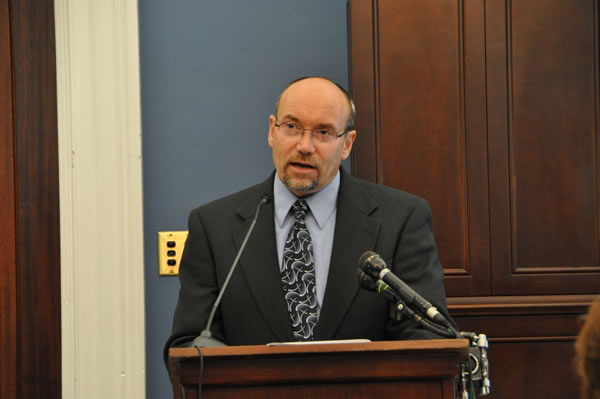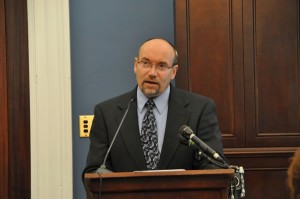National
Adoption bill aims to protect LGBT parents, kids
A tearful moment interrupted a congressional panel discussion on LGBT adoption

A tearful moment interrupted a congressional panel discussion on LGBT adoption Thursday when a gay foster parent described how state officials in Florida were threatening to take away his two children.
Martin Gill of Miami and his partner are seeking to adopt two young brothers — referred to John and James Doe in court papers — for whom they’ve cared for six years. Because a 1977 Florida statute prohibits gays from adopting, Gill has filed a lawsuit against the state in attempt to overturn the law and adopt the two children.
After showing slides of his children decorating a Christmas tree and dressed as Batman for Halloween, Gill recalled how during an intermediary court hearing the state attorney “made it all too clear” that he couldn’t remain the caregiver should the lawsuit fail.
“They answered that if the court allows the ban to stand, the state would immediately get a court order to remove these kids from our home, and they would be made available for adoption,” Gill said.
Holding back tears, Gill said the judge pressed further on whether some other kind of permanent guardianship could be available, but the response from the counsel was, “No, I don’t think it is.”
“To that, there was an audible gasp in the court room,” he said. “I felt my own heart drop.”
The intermediary court considering the case could make its decision public at any time. The American Civil Liberties Union, which has filed the lawsuit, is expecting the case to continue to the Florida Supreme Court.
Knowing that at age 4 the older child had to care for the younger one because they had no parents, Gill said his biggest fear is that the state would send the two children to separate homes.
“The lives of these two young boys would be completely devastated,” he said. “What is ironic under the current law is that how in the state of Florida, they would fulfill the goal of permanency for these two young children by splitting them up.”
To address the situation and others like it, Rep. Pete Stark (D-Calif.) has introduced the Every Child Deserves a Family Act. The bill would restrict federal funds for states — including Florida — if they have laws or practices that discriminate in adoption on the basis of sexual orientation and gender identity.
During the panel discussion intended to highlight the bill, Stark said discrimination shouldn’t take place in states that have statutes prohibiting LGBT people from adopting or where discrimination takes place without guidance from the law.
“Standards in adoption and foster care should only reflect the child’s best interest, nothing else,” Stark said. “Too many children need a loving home and we just should not close any doors.”
On March 8, Stark reintroduced the Every Child Deserves a Family Act after having previously introduced the bill last year. The new legislation makes technical changes and is intended to ensure that children won’t face discrimination on the basis of their own sexual orientation and gender identity as they’re placed into homes.
The original legislation has 14 co-sponsors that are expected to carry to the new legislation, H.R. 4806. Proponents are also working on a Senate companion bill that could be introduced before lawmakers break for recess this month.
Jennifer Chrisler, executive director of the Family Equality Council, said passing the legislation would enable thousands of children in foster care to find families.
Chrisler said a half million children are living in foster care throughout the U.S. and 120,000 of them are available for adoption. But each year, she noted, around 25,000 children “age out” of the system without finding parents.
“And yet, while there is a shortage of qualified foster and adoptive parents for these children in need, some states categorically exclude thousands of prospective parents simply because of their sexual orientation, gender identity or marital status,” she said.
Florida is the only state that has a statute explicitly prohibiting adoption by gays and lesbians. Other states, including Utah and Arkansas, have laws prohibiting unmarried couples from adopting or fostering children.
But Chrisler said the majority of states have no laws to speak to whether LGBT people can adopt, which can leaves children in foster care “vulnerable to the individual biases of agencies, case workers and judges.”
As the Every Child Deserves a Family Act builds support, litigation to rectify the situations in certain states is proceeding. Leslie Cooper, an ACLU senior staff attorney, said in addition to the Florida case, another ACLU lawsuit is pending in Arkansas to overturn the law preventing unmarried cohabitating couples from adopting.
But Cooper said lawsuits aren’t “the way to fully resolve this issue,” noting the cost of cases and the difficulty of litigation in states without specific statutes barring LGBT adoption.
“Litigation can be extremely effective and chip away at this problem, and hopefully in some states, resolve the issue,” she said. “But they aren’t the answer and can’t solve this problem in any stretch. A more global solution like this bill is what we need.”
Two panelists during the discussion presented research showing that the sexual orientation of parents has no impact on their children and many LGBT people would consider adoption if it were available to them.
Charlotte Patterson, a lesbian psychology professor at the University of Virginia who specializes in LGBT families, said 36 percent of lesbians are mothers, 16 percent of gay man are fathers and 40 to 50 percent of gays and lesbians say they would consider becoming parents.
“Children really do well in lesbian and gay parented homes as compared to demographically similar homes parented by heterosexual adults,” she said.
Patterson said growing up in LGBT households has no influence on children’s relationships with their parents, siblings and peers, nor does it affect their gender development, such as whether they want to play with traditionally male or female toys.
“The consensus here is extraordinarily clear,” she said. “Kids are well adjusted. There’s really no need to justify any kind of discrimination.”
Following the discussion, Patterson told DC Agenda studies often touted by social conservatives claiming that biological parents are better than same-sex couples at raising children are misleading.
“In general, what they’re referring to is research about kids growing up with single heterosexual parents and kids growing up with heterosexual couples,” she said. “In those studies, there are usually no openly gay or lesbian people, but the results of the studies are often used to make inferences about what kids in gay and lesbian parented families would do. That’s a mistake, of course.”
Gary Gates, a research fellow at the Williams Institute, a think-tank on sexual orientation at the University of California, Los Angeles, had similar data on the number of gays and lesbians with children and those wanting to adopt.
A common misconception, Gates said, is that it’s mostly LGBT people who are white that want to raise children, as opposed to LGBT people who belong to racial minority groups.
“All the data that we know about parenting by LGBT people and same-sex couples shows that, in fact, child-rearing is much more common in people of color,” he said. “So particularly African-Americans and Latinos and Latinas, they’re twice as likely as their white counterparts to say that they’ve raised a child.”
Regarding the full population, Gates said about one million LGBT people in the United States are raising around two million children.
The numbers are different when looking just at same-sex couples. Based on U.S. census data, Gates said about 112,000 same-sex couples throughout the United States are raising around 250,000 children.
But Gates also said the data show more same-sex couples raise children in states other than where LGBT people tend to live — often West or East Coast states with more gay friendly laws.
“What that also tells you is that same-sex couples are raising kids in states that have some of the most restrictive and challenging legal environments for gay and lesbian people raising children,” Gates said. “Many of the states with relatively high fractions of same-sex couples raising kids are very both politically and socially conservative.”
Also speaking at the panel was Nakea Paige, an 18-year-old high school student in D.C. who grew up in the foster care system. Although she’s bound this fall for Michigan State University to study biochemical engineering, Paige said her childhood was difficult because she never found a permanent home.
“I’ve been in one group home and three foster homes within three years, and having lived in three different places in three years has been a very scary experience,” she said.
Paige said one foster mother wouldn’t allow her to stay because she wasn’t receiving the full amount of compensation she thought she would receive. The foster mother had given a 30-day notice to leave, but Paige said she didn’t know about the notice until it was time for her to go.
Following the panel discussion, Paige told DC Agenda she wouldn’t have minded living with LGBT parents.
“It wouldn’t have bothered me, basically because it’s a family,” she said. “As long as I have somebody there to love me as a child, and them as a parent, then I’m fine with it.”
Pennsylvania
Malcolm Kenyatta could become the first LGBTQ statewide elected official in Pa.
State lawmaker a prominent Biden-Harris 2024 reelection campaign surrogate

Following his win in the Democratic primary contest on Wednesday, Pennsylvania state Rep. Malcolm Kenyatta, who is running for auditor general, is positioned to potentially become the first openly LGBTQ elected official serving the commonwealth.
In a statement celebrating his victory, LGBTQ+ Victory Fund President Annise Parker said, “Pennsylvanians trust Malcolm Kenyatta to be their watchdog as auditor general because that’s exactly what he’s been as a legislator.”
“LGBTQ+ Victory Fund is all in for Malcolm, because we know he has the experience to win this race and carry on his fight for students, seniors and workers as Pennsylvania’s auditor general,” she said.
Parker added, “LGBTQ+ Americans are severely underrepresented in public office and the numbers are even worse for Black LGBTQ+ representation. I look forward to doing everything I can to mobilize LGBTQ+ Pennsylvanians and our allies to get out and vote for Malcolm this November so we can make history.”
In April 2023, Kenyatta was appointed by the White House to serve as director of the Presidential Advisory Commission on Advancing Educational Equity, Excellence and Economic Opportunity for Black Americans.
He has been an active surrogate in the Biden-Harris 2024 reelection campaign.
The White House
White House debuts action plan targeting pollutants in drinking water
Same-sex couples face higher risk from environmental hazards

Headlining an Earth Day event in Northern Virginia’s Prince William Forest on Monday, President Joe Biden announced the disbursement of $7 billion in new grants for solar projects and warned of his Republican opponent’s plans to roll back the progress his administration has made toward addressing the harms of climate change.
The administration has led more than 500 programs geared toward communities most impacted by health and safety hazards like pollution and extreme weather events.
In a statement to the Washington Blade on Wednesday, Brenda Mallory, chair of the White House Council on Environmental Quality, said, “President Biden is leading the most ambitious climate, conservation, and environmental justice agenda in history — and that means working toward a future where all people can breathe clean air, drink clean water, and live in a healthy community.”
“This Earth Week, the Biden-Harris Administration announced $7 billion in solar energy projects for over 900,000 households in disadvantaged communities while creating hundreds of thousands of clean energy jobs, which are being made more accessible by the American Climate Corps,” she said. “President Biden is delivering on his promise to help protect all communities from the impacts of climate change — including the LGBTQI+ community — and that we leave no community behind as we build an equitable and inclusive clean energy economy for all.”
Recent milestones in the administration’s climate policies include the U.S. Environmental Protection Agency’s issuance on April 10 of legally enforceable standard for detecting and treating drinking water contaminated with polyfluoroalkyl substances.
“This rule sets health safeguards and will require public water systems to monitor and reduce the levels of PFAS in our nation’s drinking water, and notify the public of any exceedances of those levels,” according to a White House fact sheet. “The rule sets drinking water limits for five individual PFAS, including the most frequently found PFOA and PFOS.”
The move is expected to protect 100 million Americans from exposure to the “forever chemicals,” which have been linked to severe health problems including cancers, liver and heart damage, and developmental impacts in children.
An interactive dashboard from the United States Geological Survey shows the concentrations of polyfluoroalkyl substances in tapwater are highest in urban areas with dense populations, including cities like New York and Los Angeles.
During Biden’s tenure, the federal government has launched more than 500 programs that are geared toward investing in the communities most impacted by climate change, whether the harms may arise from chemical pollutants, extreme weather events, or other causes.
New research by the Williams Institute at the UCLA School of Law found that because LGBTQ Americans are likelier to live in coastal areas and densely populated cities, households with same-sex couples are likelier to experience the adverse effects of climate change.
The report notes that previous research, including a study that used “national Census data on same-sex households by census tract combined with data on hazardous air pollutants (HAPs) from the National Air Toxics Assessment” to model “the relationship between same-sex households and risk of cancer and respiratory illness” found “that higher prevalence of same-sex households is associated with higher risks for these diseases.”
“Climate change action plans at federal, state, and local levels, including disaster preparedness, response, and recovery plans, must be inclusive and address the specific needs and vulnerabilities facing LGBT people,” the Williams Institute wrote.
With respect to polyfluoroalkyl substances, the EPA’s adoption of new standards follows other federal actions undertaken during the Biden-Harris administration to protect firefighters and healthcare workers, test for and clean up pollution, and phase out or reduce use of the chemicals in fire suppressants, food packaging, and federal procurement.
Maine
Maine governor signs transgender, abortion sanctuary bill into law
Bomb threats made against lawmakers before measure’s passage

BY ERIN REED | On Tuesday, Maine Gov. Janet Mills signed LD 227, a sanctuary bill that protects transgender and abortion providers and patients from out-of-state prosecution, into law.
With this action, Maine becomes the 16th state to explicitly protect trans and abortion care in state law from prosecution. This follows several bomb threats targeting state legislators after social media attacks from far-right anti-trans influencers such as Riley Gaines and Chaya Raichik of Libs of TikTok.
An earlier version of the bill failed in committee after similar attacks in January. Undeterred, Democrats reconvened and added additional protections to the bill before it was passed into law.
The law is extensive. It asserts that gender-affirming care and reproductive health care are “legal rights” in Maine. It states that criminal and civil actions against providers and patients are not enforceable if the provision or access to that care occurred within Maine’s borders, asserting jurisdiction over those matters.
It bars cooperation with out-of-state subpoenas and arrest warrants for gender-affirming care and abortion that happen within the state. It even protects doctors who provide gender-affirming care and abortion from certain adverse actions by medical boards, malpractice insurance, and other regulating entities, shielding those providers from attempts to economically harm them through out-of-state legislation designed to dissuade them from providing care.
You can see the findings section of the bill here:
The bill also explicitly enshrines the World Professional Association of Transgender Health’s Standards of Care, which have been the target of right-wing disinformation campaigns, into state law for the coverage of trans healthcare:
The bill is said to be necessary due to attempts to prosecute doctors and seek information from patients across state lines. In recent months, attorneys general in other states have attempted to obtain health care data on trans patients who traveled to obtain care. According to the U.S. Senate Finance Committee, attorneys general in Tennessee, Indiana, Missouri, and Texas attempted to obtain detailed medical records “to terrorize transgender teens in their states … opening the door to criminalizing women’s private reproductive health care choices.”
The most blatant of these attempts was from the attorney general of Texas, who, according to the Senate Finance Committee, “sent demands to at least two non-Texas entities.” One of these entities was Seattle Children’s Hospital, which received a letter threatening administrators with arrest unless they sent data on Texas patients traveling to Seattle to obtain gender-affirming care.
Seattle Children’s Hospital settled that case out of court this week, agreeing to withdraw its Texas business registration in return for Texas dropping its investigation. This likely will have no impact on Seattle Children’s Hospital, which has stated it did not treat any youth via telemedicine or in person in Texas; the hospital will be able to continue treating Texas youth who travel outside of Texas to obtain their care. That settlement was likely compelling due to a nearly identical law in Washington that barred out-of-state investigations on trans care obtained solely in the state of Washington.
The bill has faced a rocky road to passage. A similar bill was debated in January, but after coming under intense attack from anti-trans activists who misleadingly called it a “transgender trafficking bill,” the bill was voluntarily withdrawn by its sponsor.
When LD 227 was introduced, it faced even more attacks from Gaines and Libs of TikTok. These attacks were followed by bomb threats that forced the evacuation of the legislature, promising “death to pedophiles” and stating that a bomb would detonate within a few hours in the capitol building.
Despite these threats, legislators strengthened both the abortion and gender-affirming care provisions and pressed forward, passing the bill into law. Provisions found in the new bill include protecting people who “aid and assist” gender-affirming care and abortion, protections against court orders from other states for care obtained in Maine, and even protections against adverse actions by health insurance and malpractice insurance providers, which have been recent targets of out-of-state legislation aimed at financially discouraging doctors from providing gender-affirming care and abortion care even in states where it is legal.
See a few of the extensive health insurance and malpractice provisions here:
Speaking about the bill, Gia Drew, executive director of Equality Maine, said in a statement, “We are thrilled to see LD 227, the shield bill, be signed into law by Gov. Mills. Thanks to our pro equality and pro reproductive choice elected officials who refused to back down in the face of disinformation. This bill couldn’t come into effect at a better time, as more than 40 percent of states across the country have either banned or attempted to block access to reproductive care, which includes abortions, as well as transgender healthcare for minors. Thanks to our coalition partners who worked tirelessly to phone bank, lobby, and get this bill over the finish line to protect community health.”
Destie Hohman Sprague of the Maine Women’s Lobby celebrated the passage of the bill despite threats of violence, saying in a statement, “A gender-just Maine ensures that all Mainers have access to quality health care that supports their mental and physical wellbeing and bodily autonomy, including comprehensive reproductive and gender-affirming care. We celebrate the passage of LD 227, which helps us meet that goal. Still, the patterns of violence and disinformation ahead of the vote reflected the growing connections between misogyny, extremism, and anti-democratic threats and actions. We must continue to advocate for policies that protect bodily autonomy, and push back against extremist rhetoric that threatens our states’ rights and our citizens’ freedoms.”
The decision to pass the legislation comes as the Biden administration released updated HIPAA protections that protect “reproductive health care” from out-of-state prosecutions and investigations.
Although the definition of “reproductive health care” is broad in the new HIPAA regulations, it is uncertain whether they will include gender-affirming care. For at least 16 states, though, gender-affirming care is now explicitly protected by state law and shielded from out-of-state legislation, providing trans people and those seeking abortions with protections as the fight increasingly crosses state lines.
****************************************************************************

Erin Reed is a transgender woman (she/her pronouns) and researcher who tracks anti-LGBTQ+ legislation around the world and helps people become better advocates for their queer family, friends, colleagues, and community. Reed also is a social media consultant and public speaker.
******************************************************************************************
The preceding article was first published at Erin In The Morning and is republished with permission.
-

 State Department2 days ago
State Department2 days agoState Department releases annual human rights report
-

 Maryland4 days ago
Maryland4 days agoJoe Vogel campaign holds ‘Big Gay Canvass Kickoff’
-

 Politics3 days ago
Politics3 days agoSmithsonian staff concerned about future of LGBTQ programming amid GOP scrutiny
-

 The White House1 day ago
The White House1 day agoWhite House debuts action plan targeting pollutants in drinking water
















